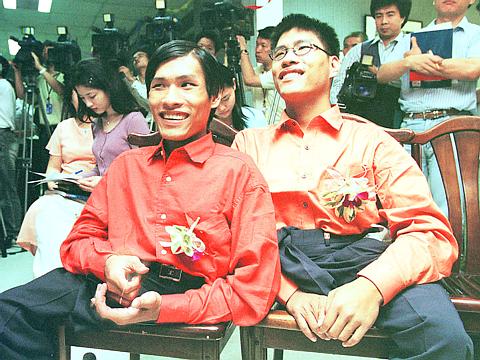Outside the political sphere, there is probably no one in Taiwan who gets as much publicity as Siamese twins Chang Chung-jen (
The celebration recalled a familiar scene two decades ago in an operating room of the National Taiwan University Hospital (NTUH,
The operation on Sept. 10, 1979, was significant because it was expected to become the world's first separation of male Siamese twins joined at the hip and born with three legs. The operation was successful and made medical history.

PHOTO: CHIANG YING-YING, TAIPEI TIMES
Unlike the large number of live TV reports today, local television stations at that time made very few real-time broadcasts except for baseball games involving teams from Taiwan in the Little League World Series each year.
Because of the publicity, Chung-jen and Chung-yi became household names and their photos before and after the operation were on the front page of every newspaper, with some still hanging on a wall at NTUH.
After a lapse of 20 years, the twins, now 23, yesterday gathered with the doctors who performed the operation in a celebration at NTUH of the 20th anniversary of the event.
National Taiwan University President Chen Wei-jao (
"The two brothers continue to make contributions to society. Chung-jen, for instance, now donates NT$800 monthly to a charity organization to help a girl in China."
Chen said, however, that "the pity is that they lack care and concern from their parents."
The parents of the brothers have been out of contact with them for years, leaving them to live on their own. They are supported by donations from the public.
Both said that they miss their parents.
In a documentary self-produced by the two brothers highlighting episodes in their life after the surgical separation, Chung-yi, the younger, sent a message to his parents that he still loves them despite all that has happened.
The documentary, made public for the first time, is an emotional film, with the two brothers using Celine Dion's theme song from the movie Titanic, "My Heart Will Go On," as the background music.

TRAGEDY STRIKES TAIPEI: The suspect died after falling off a building after he threw smoke grenades into Taipei Main Station and went on a killing spree in Zhongshan A 27-year-old suspect allegedly threw smoke grenades in Taipei Main Station and then proceeded to Zhongshan MRT Station in a random killing spree that resulted in the death of the suspect and two other civilians, and seven injured, including one in critical condition, as of press time last night. The suspect, identified as a man surnamed Chang Wen (張文), allegedly began the attack at Taipei Main Station, the Taipei Fire Department said, adding that it received a report at 5:24pm that smoke grenades had been thrown in the station. One man in his 50s was rushed to hospital after a cardiac arrest

A car bomb killed a senior Russian general in southern Moscow yesterday morning, the latest high-profile army figure to be blown up in a blast that came just hours after Russian and Ukrainian delegates held separate talks in Miami on a plan to end the war. Kyiv has not commented on the incident, but Russian investigators said they were probing whether the blast was “linked” to “Ukrainian special forces.” The attack was similar to other assassinations of generals and pro-war figures that have either been claimed, or are widely believed to have been orchestrated, by Ukraine. Russian Lieutenant General Fanil Sarvarov, 56, head

SAFETY FIRST: Double the number of police were deployed at the Taipei Marathon, while other cities released plans to bolster public event safety Authorities across Taiwan have stepped up security measures ahead of Christmas and New Year events, following a knife and smoke bomb attack in Taipei on Friday that left four people dead and 11 injured. In a bid to prevent potential copycat incidents, police deployments have been expanded for large gatherings, transport hubs, and other crowded public spaces, according to official statements from police and city authorities. Taipei Mayor Chiang Wan-an (蔣萬安) said the city has “comprehensively raised security readiness” in crowded areas, increased police deployments with armed officers, and intensified patrols during weekends and nighttime hours. For large-scale events, security checkpoints and explosives

PUBLIC SAFETY: The premier said that security would be tightened in transport hubs, while President Lai commended the public for their bravery The government is to deploy more police, including rapid response units, in crowded public areas to ensure a swift response to any threats, President William Lai (賴清德) said yesterday after a knife attack killed three people and injured 11 in Taipei the previous day. Lai made the remarks following a briefing by the National Police Agency on the progress of the investigation, saying that the attack underscored the importance of cooperation in public security between the central and local governments. The attack unfolded in the early evening on Friday around Taipei Main Station’s M7 exit and later near the Taipei MRT’s Zhongshan